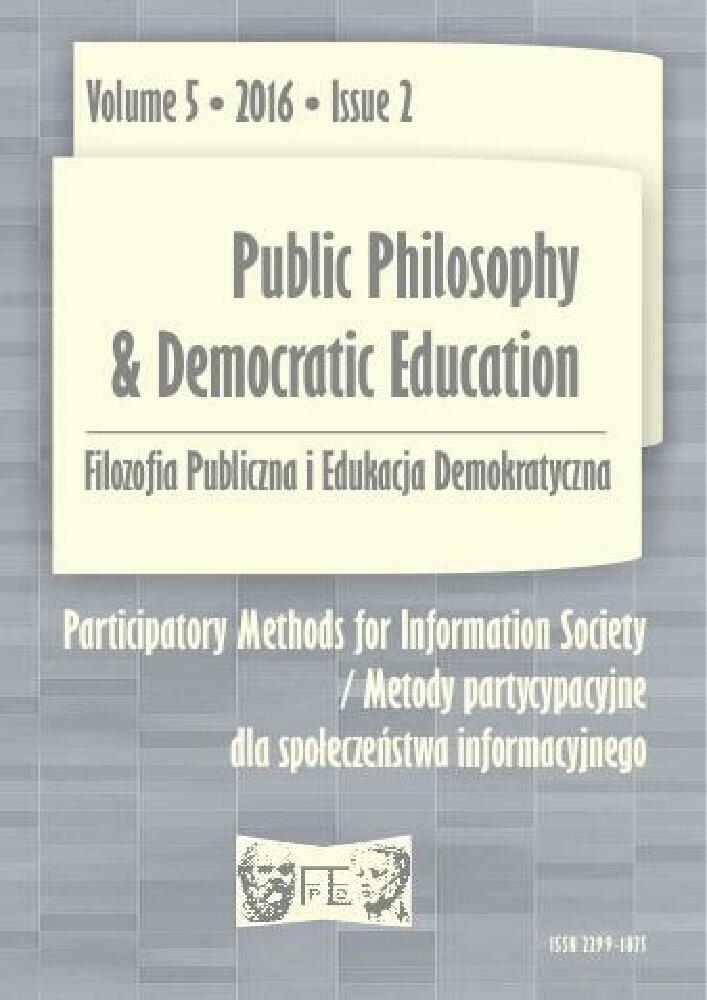Abstrakt
Question of public involvement in urban development processes grows to be among the major contemporary issues of new urban governance. Local powers, traditionally based on the elected bodies (the council and the mayor) is recently being challenged by growing, often unstructured and informal urban movements. New powers have been renegotiating supremacy relations, often using social media and digital tools. The same time digital tools are used by municipalities to expand public participation. Direct participation in urban management evolve to be a basic civic right, but it is seldom correlated with responsibilities and consequences of common, especially digital, decisions. New apps and programs create many opportunities for public participation, but social media often lack broader consideration, compromise and conciliation. Simplistic digital participation can be easily fuelled by internet ignorance, expertise relativism or ‘balanced routine’.
Bibliografia
Ahmed, K. (2017). Zuckerberg: My Facebook manifesto to re-boot globalisation. BBC News, http://www.bbc.co.uk/news/business-38998884, 16.02.2017.
Barber, B. (1984). Strong Democracy. Participatory Politics for a New Age. Berkeley: University of California Press.
Bauman, Z. (2011). Culture in a Liquid Modern World. Cambridge: Polity.
Bell, D. A., de-Shalit, A. (2011). The Spirit of Cities: Why the Identity of a City Matters in a Global Age. Princeton: Princeton University Press.
Benioff, M. (2012). Welcome to the social media revolution, BBC News, 11.05.2012, http://www.bbc.com/news/business-18013662, accessed 16.02.2017.
Bessette, J. M. (1980). Deliberative Democracy: The Majority Principle in Republican Government. In: R.A. Goldwin, W.A. Schambra (Eds.), How Democratic Is the Constitution? Washington and London: American Enterprise Institute for Public Policy Research.
Bharadwaj, V. (2012). Cultural jewels in the Gulf. International Herald Tribune, 3(21), 14.
Bruno, P. (2011). Manifesto for Agile Development of Democracy. http://agile-democratie.blogspot.com/p/mdad-manifesto-en.html, accessed 16.02.2017.
Bua, A. (2017). Scale and Policy Impact in Participatory and Deliberative Democracy: Lessons from a Multi-Level Process. Public Administration, 95(1), 160-177.
Burgess, J. Chilvers, J. (2006). Upping the Ante: A Conceptual Framework for Designing and Evaluating Participatory Technology Assessments. Science and Public Policy, 33(10), 713-728.
Chandler, J.A. (2001). Local Government Today. Manchester: Manchester University Press.
Czepczyński, M. (2014). (Nie)odpowiedzialni za miasto. O ograniczeniach, poszukiwaniach i nauce kompromisu między partykularnym a wspólnym dobrem. Studia KPZK PAN, 157, 6-16.
Czepczyński, M., Szołucha K. (2017). Partycypacja mieszkańców w zarządzaniu przestrzenią. In: G. Chaberek-Karwacka (Ed.), Współczesne uwarunkowania procesów zarządzania przestrzenią w Polsce. Gdańsk: Wydawnictwo UG.
Davies, J. (2012). Network Governance Theory: A Gramscian Critique. Environment and Planning A, 44(11), 2687-2704.
Dunning, D., Johnson, K., Ehrlinger, J., Kruger, J. (2003). Why people fail to recognize their own incompetence. Current Directions in Psychological Science, 12(3), 83-87.
Florida, A. (2013). Participatory Democracy versus Deliberative Democracy: Elements for a Possible Theoretical Genealogy. Two Histories, Some Intersections. In: 7th ECPR General Conference, Bordeaux, 4-7 September 2013.
Freud, Z. (2002). Civilization and Its Discontents. London: Penguin.
Greenberg, M. (1995). The Poetics of Cities: Designing Neighborhoods that Work. Columbus: Ohio State University Press.
Habermas, J. (1998). Between Facts and Norms: Contributions to a Discourse Theory of Law and Democracy. Cambridge, MA: MIT Press.
Hayden, T. (2005). The Port Huron Statement. The Vision Call of the 1960s Revolution. New York: Avalon Publishing.
Hoppe, R. (2010). The Governance of Problems: Puzzling, Powering and Participation. Bristol: The Policy Press.
Inglehart, R. (1995). Changing Values, Economic Development and Political Change. International Social Science Journal, 47(3), 379-403.
Kaufman, A. S. (1960). Human Nature and Participatory Democracy. In: C. J. Friedrich (Ed.), Responsibility (pp. 266-289). New York: Liberal Art Press.
Kenyon, G. (2016). The man who studies the spread of ignorance. BBC Future, 06.01.2016. http://www.bbc.com/future/story/20160105-the-man-who-studies-the-spread-of-ignorance, accessed 15.12.2016.
Lange, M. de, Waal, M. de (2013). Owning the city: New media and citizen engagement in urban design. First Monday, 18(11). http://firstmonday.org/ojs/index.php/fm/article/view/4954/3786, accessed 15.12.2016.
Leadbeater, C. W., Miller, P. (2004). The Pro-am Revolution: How Enthusiasts are Changing Our Society and Economy. London: Demos.
Lévinas, E. (1991). Totality and Infinity. An Essay on Exteriority. Dordrecht: Kluwer.
Mansbridge, J. (1983). Beyond Adversary Democracy. Chicago: The University of Chicago Press.
Nawratek, K. (2008). Miasto jako idea polityczna. Kraków: Korporacja Ha!art.
Omidyar, P. (2014). Social Media: Enemy of the State or Power to the People? The Huffington Post, http://www.huffingtonpost.com/pierre-omidyar/social-media-enemy-of-the_b_4867421.html, accessed 15.12.2016.
Proctor, R., Schiebinger, L. (2008) (Eds.). Agnotology: The Making and Unmaking of Ignorance. Stanford: Stanford University Press.
Rawls, J. (1993). Political Liberalism. The John Dewey Essays in Philosophy. New York: Columbia University Press.
Seay, L. (2014). Does slacktivism work? The Washington Post, 12.03.2014. https://www.washingtonpost.com/news/monkey-cage/wp/2014/03/12/does-slacktivism-work, accessed 15.12.2016.
Ta, J. Q. (2014). What Impact Has Social Media Truly Had On Society. Business 2 Community. http://www.business-2community.com/social-media/impact-social-media-trulysociety-0974685#ZvVjyc0q3PtYt0zj.99Read more at http://www.business2community.com/social-media/impact-socialmedia-truly-society-0974685#ZvVjyc0q3PtYt0zj.99, accessed 15.12.2016.
Wainwright, H. (2003). Reclaim the State: Experiments in Popular Democracy. London: Verso.
Wainwright, O. (2017). Tinder for cities: how tech is making urban planning more inclusive. The Guardian, 24.01.2017. https://www.theguardian.com/cities/2017/jan/24/tinder-cities-technology-making-urban-planning-interactive, accessed 16.02.2017.
Wortham, J. (2016). Is Social Media Disconnecting Us From the Big Picture? The New York Times Magazine, 22.11.2016. https://mobile.nytimes.com/2016/11/22/magazine/is-socialmedia-disconnecting-us-from-the-big-picture.html?, accessed 15.12.2016.
Zector Architects (2015). http://www.zectorarchitects.net/urbansim/critical-urbanism/, accessed 15.12.2016.
Licencja
Prawa autorskie (c) Autorzy zachowują prawa autorskie i prawa do publikacji swoich artykułów w tym czasopiśmie, przyznając czasopismu prawo do ich rozpowszechniania na warunkach CC BY-NC-ND 4.0
